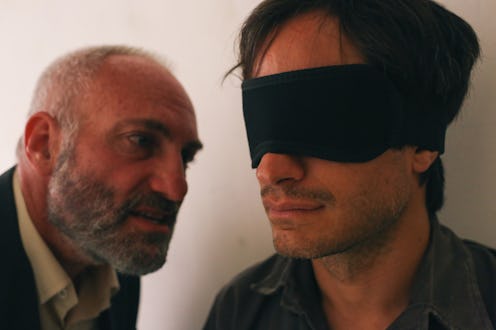Entertainment
Jon Stewart's 'Rosewater' Sticks to the Truth

Rosewater starts off just a bit closer to the truth than most movies of its ilk — dramatic retellings of contemporaneous political news stories, that is. Many are familiar with the real world account of journalist Maziar Bahari’s four-month imprisonment and torture by the Iranian government, as chronicled in Bahari's book They Came for Me. But even more will play audience to the ghastly episode now that writer/director Jon Stewart (The Daily Show’s very own) has made his feature debut with Rosewater. Although They Came for Me offers a gripping narrative that might be hard to imagine earning just depiction on the big screen, Stewart's film has a particular advantage: What bridges the picture and the true events is The Daily Show host's involvement therein.
Some would go so far as to say that Stewart and his Comedy Central program were at fault for Bahari’s 118-day incarceration, prompting with a single satirical segment that painted correspondent Jason Jones as a spy colluding with guest Bahari paranoia on the part of Iran’s then-President Mahmoud Ahmadinejad’s administration. Bahari himself facetiously placed blame on the Daily Show bit (though made sure to recant thereafter when journalists misinterpreted the joke). But however significant the effect of Stewart’s program on the issues that took way, it's not hard to identify the first time filmmaker’s personal stake in this particular story.
As such, we get a retelling of the bout of injustice that veers rather close to that which we understand to be the factual account. Bahari, an Iran-born Newsweek journalist reporting on the country’s 2009 presidential election between incumbent Ahmadinejad and challengers like Mir-Hossein Mousavi and Mehdi Karroubi.
Suspicions of a fixed election that concluded in Ahmadinejad’s favor (despite belief that Mousavi had truly won the popular vote) resulted in a number of riots around Iran, one of which was captured on film for the purpose of international broadcast by Bahari.
Following his achievement of footage that might damn the reputation of the Ahmadinejah regime, not to mention his brief appearance on a Daily Show episode that didn’t exactly illustrate a high opinion of its leader, Bahari was apprehended and held in captivity by an unnamed agent of the Iranian government — one called “Rosewater” in the film, a credit to his scent — and hit with a range of accusations from espionage and treason to Zionist sympathies to sexual perversion.
While the series of events leading up to Bahari’s imprisonment in Stewart’s film all hold water, the even more impressive loyalties come from the writer’s internal struggle while battling the oppression of his captors. In the film, we see Bahari cling tight to memories of his sister (deceased following her own activism) and mental projections of his father, he too a former political prisoner — both constructs, admittedly cinematic in nature, are touted by Bahari himself as a means used to keep his sanity during his time in the prison.
Likewise, Bahari’s relationship with the anonymous agent overseeing his stay seems to echo the pair’s real world rapport very closely. As Bahari has stated, the “Rosewater” figure took the role very personally. Additionally, as he is depicted in the film, Rosewater is said by Bahari to be a sexually obsessed man with a misguided fascination with New Jersey and suspicion of Anton Chekov.
Stewart does design the film in the interest of narrative build, crafting an early-acts Bahari as less interested in the injustice of the electoral rigging than one might believe the established political journalists to really have been. (Stewart also avoids roping in the Iranian government’s suspicion of Bahari’s fandom of Pauly Shore — apparently a hot button issue in reality — presumably to maintain an air of gravity… though I can’t really say the story would have benefited from any mention of Son-in-Law.)
These elements aside, Rosewater amounts to an unusually true-to-life recollection of the facets of a truly important piece of history. Whatever combination of Stewart’s feeling of personal culpability and his interest as a member of the political news circuit, he managed a movie that told Bahari’s story with esteem for what the imprisoned journalist sought to share in the first place: the truth.
Image Credits: Open Road Films (2); Comedy Central (2)